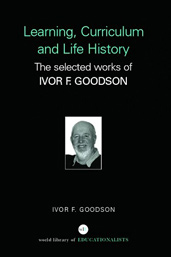Learning, Curriculum and Life Politics: the selected works of Ivor F. Goodson
Nations at Risk
National Curriculum and National Power
In post-war Britain the national state's powers over education were increasingly devolved to local education authorities (LEAs). This made the schools more responsive to the local 'communities' than to 'the nation'. In addition the teachers' unions were able to assert a growing influence over issues of curriculum and assessment reform. As we have noted, this led some comprehensive schools to develop more comprehensive curricula which moved beyond the 1904-style academic curriculum 'suited to only a few'. The national state's loss of control, specifically loss of control over curriculum, therefore led to patterns of prioritizing which went a long way from the political settlement enshrined in the 1904 Regulations: the so-called traditional subjects. This loss of control therefore threatened those groups which had benefited from this political settlement. The social prioritization so well-established in the early twentieth century was plainly under attack. In short, the 'nation' as represented in these privileged groups was 'at risk'.
Of course reasserting the primacy of curriculum as a vehicle for the education of the elite and custodial classes entirely fits a version of nation-building. These leadership and professional groups are precisely those who will rule and administer the nation — it is consistent to remake the curriculum in their image and reconstruct schools as mechanisms for the selection of this national meritocracy.
But the form of this national reconstruction at the level of curriculum, of course, reflects the existing perception and situation of the 'nation'. Plainly at this point in its history the UK nation-state reflects the post-war period of precipitous decline. Since 1945 the large aspirations of the nation-state as a major imperial power, a major player on the world stage, have had to be severely redefined. A particularly problematic aspect of this imperial angst had been how to deal with the plurality of other cultures. This concern is often wished off into the field of 'multicultural studies' but is of course integral to notions of identity and democracy in general. Alongside ideological decline has been a savage experience of economic decline. In both of these aspects of decline the British establishment, the elite and the professions, have been implicated. As a result any campaign to reconstruct and revive the nation would have to respond to this experience of precipitous decline. The particular version of nation-building through curriculum is therefore likely to reflect this perception.
The definition of a central curriculum could in fact take a number of forms, but there are two major directions. One version would specify a common set of goals and objectives and certain amount of common content. In this version the teachers and students are allowed some flexibility and a degree of accommodation with local conditions and concerns is both expected and encouraged. This version of central curriculum would have resonated well with the experience of the UK educational system in the 20th Century.
